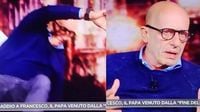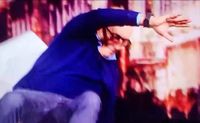In a surprising turn of events during a live broadcast, Alessandro Sallusti, the director of Il Giornale, experienced an unexpected fall while discussing the impact of Pope Francesco's pontificate on Rete 4. The incident occurred on April 21, 2025, during a special dedicated to the late pope, who had passed away earlier that day.
As Sallusti was delivering his commentary, he remarked, "Never before has the world been so inflamed," when suddenly, his chair broke beneath him, causing him to tumble to the ground. Fortunately, the seasoned journalist managed to cushion his fall by leaning on his arms, avoiding a more serious mishap.
Immediately after the incident, Sallusti stood up, assuring the audience with a calm, "Everything's okay." His ability to recover quickly and continue his commentary impressed viewers, as he remained composed despite the unexpected interruption.
The host of the program, Gianluigi Nuzzi, quickly approached Sallusti to check on his condition. In a light-hearted moment, Nuzzi joked, "Perhaps you denounced something too strong, and a lightning bolt arrived!" This humorous remark brought a smile to the studio, diffusing any tension from the incident.
The broadcast quickly became a topic of discussion online, with the video of Sallusti's fall going viral within minutes. Viewers shared their reactions, ranging from amusement to sympathy, as the scene captured the unpredictable nature of live television.
Sallusti's commentary focused on the challenges faced during Pope Francesco's tenure, emphasizing that leaders around the world had failed to heed the pope's calls for peace. "The world has caught fire," he reiterated, indicating that the global situation had deteriorated despite the pontiff's efforts.
The special on Rete 4 was not the only tribute to Pope Francesco that evening. Other networks also adjusted their programming to honor the late pope. On Rai1, Bruno Vespa hosted a special edition of Porta a Porta, which faced criticism for featuring an all-male panel. Meanwhile, Canale 5 aired a film about the life of the Argentine pontiff, and Nove showcased a collection of interviews with the pope conducted by Fabio Fazio over the years.
The death of Pope Francesco significantly altered the television schedules across Italy, leading to a wave of programming changes in the days that followed. Many shows announced pauses in their regular broadcasts to pay their respects, reflecting the profound impact the pope had on both the nation and the world.
As the evening progressed, the incident with Sallusti became a memorable moment in the context of the broader conversation surrounding the pope's legacy. It served as a reminder of the unpredictable nature of live broadcasting, where anything can happen at any moment.
Commentators and viewers alike took to social media to express their thoughts on the incident, with some humorously labeling it as the first miracle of Pope Francesco. The blend of seriousness regarding the pontiff's impact and the light-heartedness of Sallusti's fall created a unique atmosphere during the broadcast.
In reflecting on the events of the evening, it became clear that while the broadcast was marked by an unexpected mishap, it also highlighted the importance of dialogue and reflection on the life of Pope Francesco. His commitment to peace and social justice resonated throughout the discussions, even as the incident provided a moment of levity.
The response to the broadcast indicates a deep connection between the public and the legacy of Pope Francesco, suggesting that his influence will continue to be felt long after his passing. Sallusti's fall, though unintended, became a part of the narrative surrounding the pope's life and the ongoing conversations about his contributions to the world.
As the news cycle continues to cover the impact of Pope Francesco's death, the incident during the broadcast serves as a reminder of the human side of journalism—where moments of vulnerability can occur even amidst serious discussions. The blend of humor and respect for the pope's legacy encapsulates the unique nature of live television, where every moment is an opportunity for connection and reflection.









